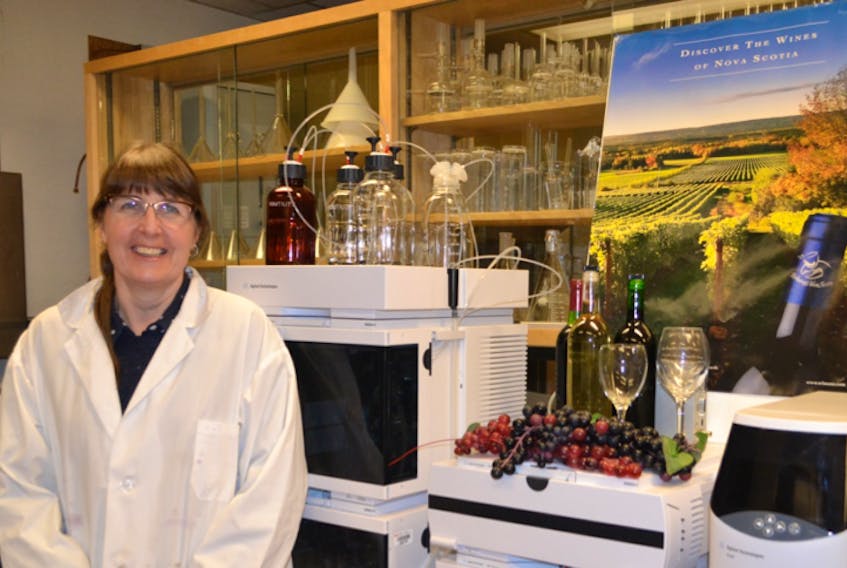KENTVILLE, NS - Research to be conducted in a lab workspace being renovated at the Agriculture and Agri-Food Canada research centre in Kentville could lead to new knowledge and innovations for Nova Scotia’s burgeoning wine industry.
A 400 square-metre space is currently being converted into a wine research lab, part of a multi-dimensional research approach in support of Nova Scotia grape growers and vintners.
Research scientist Dr. Shawna MacKinnon, a food and wine chemist, has been hired to get the lab set up, oversee it and conduct research. She said on April 10 that renovations to the space began about three weeks earlier.
She said the goal is to gain new knowledge and transfer it to vineyards and wineries, contributing to their improved productivity and success. The research will fit hand-in-glove with a provincial government initiative to increase vine acreage in Nova Scotia to 2,000 acres by 2020.
“The whole purpose of this new Kentville research winery is to do research on grapes and wine for the Nova Scotia vineyards and wineries and to support their development, growth and expansion, but to also contribute to supporting vineyards and wineries across Canada,” MacKinnon said.
READ A RECENT STORY ON THE NOVA SCOTIA ICEWINE FESTIVAL HERE.
She said the initiative should provide a lot of insight for grape growers and wine producers. Researchers will be harvesting grapes, bringing them in to look at quality and evaluating them for different parameters that are important for deciding when to harvest.
There will be a space to crush and extract juice from grapes and to produce, process and bottle red and white wines. Several fermentation chambers are being installed so that the grapes can be fermented at different temperatures and volumes for experimentation. There will also be a wine cellar.
She said another aspect that will be particularly helpful to vineyards and wineries in the region will be tasting panels. They’ll be having sommeliers visit to assess the wines produced in the lab to help vineyard and winery operators decide which varieties to plant and how the vine performance of those varieties affects wine quality. This will help in the decision-making process when it comes to planting, harvesting and the protocols used to produce wines.
MacKinnon said Agriculture and Agri-Food Canada already has an older vineyard plot at the research station. About two years ago, approximately two acres of vines were planted for a new research vineyard. She said it normally takes about three years for vines to mature and begin producing grapes, so it will be this season or next when they get the first crop. The purpose is to experiment with and test local and European grape varieties.

“There is an ongoing conversation in the region about which varieties grow best in our climate or the terroir that we have,” MacKinnon said. “That was part of the reason for planting those.”
She said a light-emitting, hand-held device being evaluated for its ability to pinpoint grape ripeness to identify the best harvest time – a key factor in the production of high-quality wines – would be an excellent tool. MacKinnon has done some work with the device with research scientist Dr. John DeLong, harvesting and preparing some of the grapes for evaluations in his study.
“That would be a fantastic tool for the vineyards because, of course, the quality of the wine is really affected by when you harvest the grapes,” MacKinnon said.
She said they are very excited over the project. They’ve forged good relationships with vineyards and wineries in the region and they continue to foster those in an effort to bolster Nova Scotia’s wine industry.
MacKinnon said they have a team of scientists at the research centre with a wide range of expertise in the field. She said having that expertise all together in one place would be very helpful to grape growers and vintners.
The lab renovation builds on a $400,000 research project currently underway at the research centre involving grape varieties, growing techniques and conditions. To date, 70 sites have been mapped for insect pests and grapevine viruses and bacteria. Soil, topography and climate are also being assessed to see how these factors affect wine flavor and quality.
Samples have been taken from vineyards throughout Nova Scotia. A monitoring system is in place to measure the effect of cold weather on grape vines and winter hardiness.









